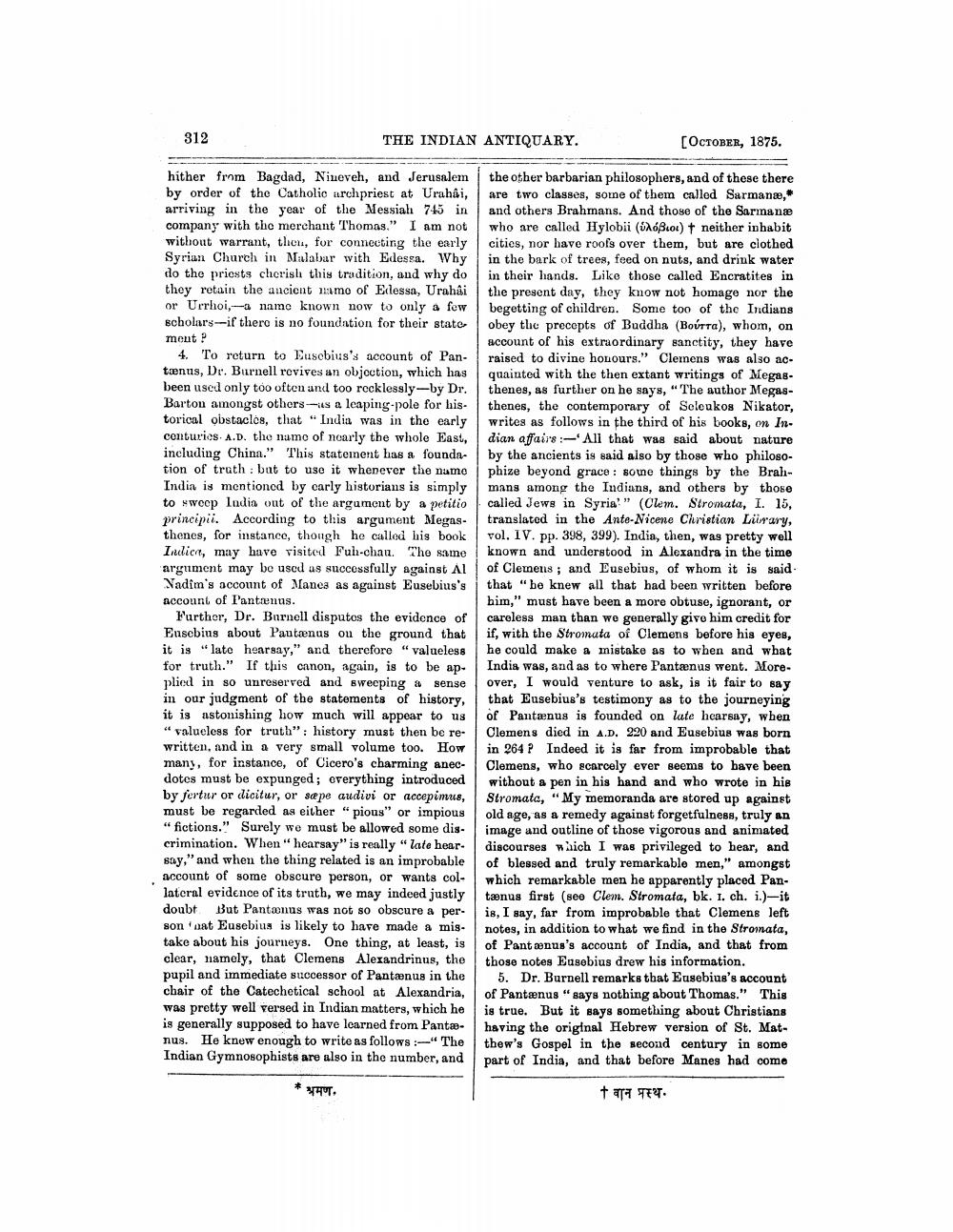________________
312
THE INDIAN ANTIQUARY.
[OCTOBER, 1875.
hither from Bagdad, Nineveh, and Jerusalem the other barbarian philosophers, and of these there by order of the Catholio archpriest at Urahai, are two classes, some of them called Sarmanæ,* arriving in the year of the Messiah 745 in and others Brahmans. And those of the Sarmanæ company with the merchant Thomas." I am not who are called Hylobii (61) + neither inhabit without warrant, thou, for connecting the early cities, nor have roofs over them, but are clothed Syrian Church in Malabur with Edessa. Why in the bark of trees, feed on nuts, and drink water do the priests cherish this tradition, and why do in their hands. Like those called Encratites in they retain the ancient namo of Edessa, Urahải the present day, they know not homage nor the or Urrhoi,--a name known now to only a few begetting of children. Some too of the Indians scholars--if there is no foundation for their stato obey the precepts of Buddha (Boúrta), whom, on ment?
account of his extraordinary sanctity, they have 4. To return to Eusebius's account of Pan- raised to divine honours." Clemens was also actænus, Dr. Burnell revives an objection, which has quainted with the then extant writings of Megasbeen used only too often and too recklessly-by Dr. thenes, as further on he says, "The author MegasBarton amongst others is a leaping-pole for his. thenes, the contemporary of Seleukos Nikator, torical obstacles, that "India was in the early writes as follows in the third of his books, on Inconturies. A.D. the name of nearly the whole East, dian affairs :- All that was said about nature including China." This statement has a founda- by the ancients is said also by those who philosotion of truth : but to use it whenever the namo | phize beyond grace : sone things by the BrahIndia is mentioned by carly historians is simply mans among the Indians, and others by those to wwoop ludio out of the argument by a petitio called Jews in Syria'" (Clem. Stromata, 1. 15, principii. According to this argument Megas- translated in the Ante-Nicene Christian Lümary, thenes, for instance, though he called his book vol. IV. pp. 398, 399). India, then, was pretty well Indiert, may have visited Ful-chau. The same known and understood in Alexandra in the time argument may be used as successfully against Al of Clemens ; and Dusebius, of whom it is said Nadim's account of Manea as against Eusebius's that "be knew all that had been written before account of l'antenus.
him," must have been a more obtuso, ignorant, or Further, Dr. Barnell disputes the evidence of careless man than wo generally give him credit for Eusebius about Pauteenus on the ground that if, with the Stromata of Clemens before his eyes, it is "lato hearsay," and therefore "valueless he could make a mistake as to when and what for truth." If this cnnon, again, is to be ap. India was, and as to where Pantanus went. More plied in so unreserved and sweeping a sense over, I would venture to ask, is it fair to say in our judgment of the statements of history, that Eusebius's testimony as to the journeying it is astonishing how much will appear to us of Pantænus is founded on late hearsay, when " valueless for truth": history must then be re- Clemens died in A.D. 220 and Eusebius was born written, and in a very small volume too. How in 264 ? Indeed it is far from improbable that many, for instance, of Cicero's charming anec- Clemens, who scarcely ever seems to bave been dotes must be expunged; overything introduced without a pen in his hand and who wrote in his by fertur or dicitur, or sæpe audivi or accepimus, Stromato, "My memoranda are stored up against must be regarded as either "pious" or impious old age, as a remedy against forgetfulness, truly an “fictions." Surely we must be allowed some dis- image and outline of those vigorous and animated crimination. When "hearsay" is really "late hear. discourses which I was privileged to hear, and say," and when the thing related is an improbable of blessed and truly remarkablo men," amongst account of some obscure person, or wants col- which remarkable men he apparently placed Panlateral evidence of its truth, we may indeed justly tænus first (see Clem. Stromata, bk. 1. ch. i.)-it doubt But Pantanus was not so obscure a per is, I say, far from improbable that Clemens left son oat Eusebius is likely to have made a mis. notes, in addition to what we find in the Stromata, take about his journeys. One thing, at least, is of Pantanus's account of India, and that from clear, namely, that Clemens Alexandrinus, the those notes Eusebius drew his information. pupil and immediate successor of Pantænus in the 5. Dr. Burnell remarks that Eusebius's account chair of the Catechetical school at Alexandria, of Pantænus "says nothing about Thomas." This was pretty well versed in Indian matters, which he is true. But it says something about Christians is generally supposed to have learned from Panta- having the original Hebrew version of St. Matnus. He knew enough to write as follows:- The thew's Gospel in the second century in some Indian Gymnosophists are also in the number, and part of India, and that before Manes had come
* 440
t T T H 4.




